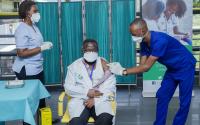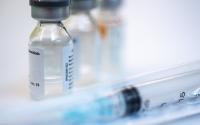[ad_1]
Table of Contents
Infliximab associated with lower likelihood of COVID-19 antibodies
People with COVID-19 infections who also used the inflammatory bowel disease (IBD) drug infliximab had significantly fewer detectable antibodies than those who used vedolizumab, which treats IBD without the immune suppression, according to a study yesterday in Gut.
Dubbed CLARITY (ImpaCt of bioLogic therApy on saRs-cov-2 Infection and immuniTY), the study looked at 6,935 patients ages 5 and above with IBD from 92 UK hospitals from Sep 22 to Dec 23, 2020, and researchers plan to follow them up to 40 weeks thereafter. About two thirds (67.6%) of the cohort took infliximab, while the remainder took vedolizumab. Patients’ median age was 39 years.
In both general seroprevalence surveys and seroconversion tests following laboratory-confirmed COVID-19 diagnoses, lower antibody presence was seen in those who took infliximab, raising the researchers’ concerns about reinfection risk.
While 3.4% of the infliximab-treated group had SARS-CoV-2 seroprevalence, 6.0% of the vedolizumab-treated group did (seropositivity odds ratio [OR], 0.66; 95% confidence interval [CI], 0.51 to 0.87). Those who were on additional immunomodulators such as thiopurines and methotrexate compared with those who were not also had a reduced likelihood of being seropositive (OR, 0.70; 95% CI, 0.53 to 0.92).
Of people with confirmed COVID-19 infections, only 48.0% of the 81 treated with infliximab demonstrated seroconversion, compared with 83.3% of the 36 on vedolizumab. Additionally, the magnitude of anti-COVID reactivity was lower (median 0.8 cut-off index vs 37.0).
“The poor antibody responses observed in patients treated with infliximab raise the possibility that some patients may not develop protective immunity after COVID-19 infection, and might be at increased risk of reinfection,” said study lead Tariq Ahmad, DPhil, MBChB, in a University of Exeter press release. “What we don’t yet know is how use of anti-TNF drugs will impact antibody responses to vaccination.” He is referring to anti-tumor necrosis factor drugs, which include infliximab and are effective treatments for immune-mediated inflammatory diseases.
Mar 22 Gut study
Mar 22 University of Exeter press release
COVID-19 pandemic linked with steady weight gain
After the United States’ mid-March shelter-in-place began, a 269-person cohort gained on average 1.5 pounds every month, regardless of comorbidities or geographic location, according to a research letter published yesterday in JAMA Network Open.
While the study did not explore possible reasons, the researchers point to past articles that discuss a decrease in daily steps taken and self-reports of increased overeating and snacking during the initial shelter-in-place.
The researchers recorded an average of 28 weigh-ins per participant from Feb 1 to Jun 1, 2020. (Shelter-in-place orders occurred in 45 states from Mar 18 to Apr 6.) Almost half (48.3%) the participants were men, 77% were White, and average age was 52 years.
“Although this may not appear clinically important, prolonged effects as have occurred with the pandemic might lead to substantial weight gain,” the researchers write. “The detrimental health outcomes suggested by these data demonstrate a need to identify concurrent strategies to mitigate weight gain, such as encouraging healthy diets and exploring ways to enhance physical activity, as local governments consider new constraints in response to SARS-CoV-2 and potential future pandemics.”
Mar 22 JAMA Netw Open research letter
Countdown begins for end of DRC’s Ebola outbreak
In the Democratic Republic of the Congo’s (DRC’s) latest Ebola outbreak, the last patient was discharged from a treatment center in Katwa yesterday, starting the 42-day countdown until the country is declared free of the virus again.
In an update on Twitter today, the World Health Organization (WHO) African regional office said the countdown began just 37 days after the virus reappeared in the country. The outbreak was declared on Feb 7. Early genetic analysis suggested that the virus resurgence was linked to contact with a survivor of the recent large outbreak centered in the DRC’s North Kivu province.
So far, 12 cases, 1 of them listed as probable, have been reported in the DRC’s 12th Ebola outbreak. Six people have died from their infections.
Elsewhere, Guinea’s outbreak total remains at 18 cases, including 9 deaths, the WHO said in a separate Twitter update. So far, nearly 4,000 people have been vaccinated.
Mar 23 WHO African regional office tweet
Mar 23 WHO African regional office tweet on Guinea outbreak
[ad_2]
Source link












